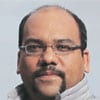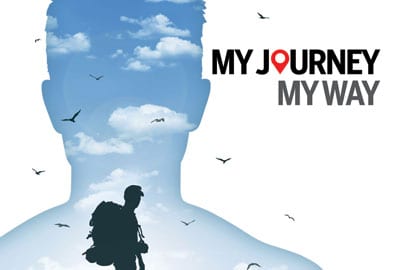My Journey My Way
Being eternal optimists, we at ETW firmly believe that the positive trend witnessed by the tourism industry in 2014 will continue in 2015 with increased vigour and versatility. In this New Year Special, we bring you 15 out-of-the-box travel professionals who with their fresh ideas and new tourism concepts have added a zing to the world of travel and tourism
 Thinlas Chorol, Trained Mountaineer and Founder of Ladakhi Women’s Travel Company, a Leh based travel agency providing women guides and porters for treks and tours
Thinlas Chorol, Trained Mountaineer and Founder of Ladakhi Women’s Travel Company, a Leh based travel agency providing women guides and porters for treks and tours
The journey
Starting my own travel company was the most important factor for me. At that time, there was no other travel agency like it in Ladakh, a travel agency that uses only female guides. Since we started in 2009, we have not seen any other company in Ladakh do the same, so I believe this was important not only for me, but for women in Ladakh. I love the fact that through my work, we can create job opportunities for women in Ladakh. Especially in an industry that is so male dominated. There are many women who want to work in this field. The target clientele are international tourists, we do not do much marketing, but people come to know about our agency through word of mouth. A highlight of my career was when in 2013 I was given the Indian Chambers of Commerce Ladies wing ‘Jankidevi Award’. This was a great honour for me.
Countering challenges
The main issue for us is the lack of professional female guides. The solution really is simple – education. We provide free training to the women who join our company. First aid, floura and fauna, Ladakhi history and many other subjects are things that a good Ladakhi guide should have knowledge about. But very few know about these aspects when they start as a guide, so we educate them. Another issue is that the season here is very short. So we are trying to create job opportunities for our staff in the off season as well. This remains a large challenge. We have been experimenting with food preservation. Bottling tomatoes to be sold in the long Ladakhi
winters.
The way ahead
Those associated with the travel industry in Ladakh suffer from the short tourism season. Efforts are being made to extend the season with winter activities. I do believe this will benefit Ladakh in the future. Ladakh is a wonderful place in the winters too. For example, winter treks allow tourists to see the elusive snow leopard. Ice hockey games are also becoming popular, which is an interesting activity for sports fans to enjoy.
(As told to Sudipta Dev)
 Gopinath Parayil, Founder and Managing Director, The Blue Yonder, an initiative that was set up to bring focus on the depleted condition of River Nila in central Kerala
Gopinath Parayil, Founder and Managing Director, The Blue Yonder, an initiative that was set up to bring focus on the depleted condition of River Nila in central Kerala
The journey
The Blue Yonder (TBY) has been offering holidays since early 2004 in India. It was an initiative that was set up to bring into the attention of the world a sadly depleted River Nila (Bharatapuzha) in central Kerala. Covering three primary areas of people, culture and wilderness, our holidays are designed in a way that it is economically, socially and environmentally just. As part of creating better places for people to live and visit, TBY created a sense of belonging among the locals by relating various projects in destinations. We connected fishing communities, potters, folk artists, handloom textile weavers, etc, whose livelihoods were directly or indirectly related to the river and its civilisation. Now based in Puducherry, TBY offers holiday experiences in different states of India – Tamil Nadu, Puducherry, Himachal Pradesh, Sikkim, Rajasthan, Kerala and Karnataka.
Countering challenges
I have learnt that tourism is one of the most powerful tools for building compassionate communities. This applies to both hosts and travellers. If carefully managed and run responsibly, it is an ideal tool to achieve sustainable development. The biggest challenge is to ensure that the values we adhere to and the practices we follow are on one and not parallel roads. Positioning a company based on ‘responsibility’ and ‘consciousness’ in itself is the challenge. Our business is all about attitude. Lack of transparency and accountability when it comes to government functions has always been a challenge for TBY.
The way ahead
Our model of destination development in consultation with local communities has given us an extra edge when it comes to maintaining the travel experiences we offer. Our recent initiative ‘Pokkali – The Story of a Rice’ was featured at ITB Asia 2014 and at the World Food and Travel Summit as a Climate Change Resistant Food initiative. Last year, TBY committed to purchasing more than 50 tonnes of Pokkali rice from struggling farmers to create a market and provide financial support in a sustainable way. Our travellers are now visiting these villages to meet the farmers and understand the symbiotic farming tradition that is an intangible heritage of humanity. We are now developing similar initiatives in different parts of the country. With more liberal approaches to visa on arrival, we hope to see increased arrivals from select countries. However unless the travel industry diversifies the experiences and improves the service quality, we will be in this lean patch for a long haul. I see dependency on foreign B2B business reducing for local operators as technological advances has brought destinations closer to customers. Technology and social media are giving more options for comparative prices, so unless we keep innovating and diversifying, challenges are bigger for the industry.
(As told to Rituparna Chatterjee)
 Jaal Shah, Founder, RezLive.com, a global reservation system and group managing director, Travel Designer Group
Jaal Shah, Founder, RezLive.com, a global reservation system and group managing director, Travel Designer Group
The journey
I was part of a small team that started Travel Designer Group way back in 1999 as managing director. We started as a small tour operating company offering short-haul destinations to our travel partners. Slowly and steadily, I diversified the group activity with the launch of products like Designer Packages (offline outbound) and global reservation system, RezLive.com which was launched in 2007 and has brought the entire world at the doorsteps of travel agents. One thing that motivated me to come up with a product like RezLive.com, was to make the life of our travel partners easy. As the traditional way of making a booking was lengthy and required lot of man hours, RezLive.com came as a solution and provided travel agents the much required access to make bookings on their own by getting regular support from our team. Since inception RezLive.com has experienced year-on-year growth. It has been a vigorous journey for us and we look forward to continuing our global expansion with our best services. Currently, we have extended our presence in South Africa, Malaysia, Morocco, Nepal and the Philippines and have emerged as one of the fastest growing B2B global reservation systems in Asia Pacific and the Middle East on the basis of innovation and service quality. This year we will be looking at revamping RezLive.com and making the inventory even bigger by contracting with other leading hotel chains, so that we put the whole world at the fingertips of our travel partners. The recently launched RezLive.com Mobile App will enable our travel partners to perform certain critical tasks and will even take us one step closer to them.
Countering challenges
I always believed in one thing – whatever you can do or dream you can, begin it. Boldness has genius, power and magic in it. So when the idea to start up something on my own came to my mind, I was ready for it and was also prepared to face all the challenges related to it. Success is something that doesn’t come easily, you need to sweat hard to earn that.
The way ahead
2015 will be a year where small travel agents will concentrate on technology upgradation, so that they can better service their customer and suffice their needs. Also, people will look for some unexplored destinations to travel and feel the experience. Furthermore, social media will make the biggest impact on the travel industry and every travel company should have a successful social media strategy.
(As told to Reema Lokesh)
 Gautam Shewakramani, Founder and CEO, AudioCompass, an audio guide provider at India’s major tourism spots
Gautam Shewakramani, Founder and CEO, AudioCompass, an audio guide provider at India’s major tourism spots
The journey
AudioCompass’ vision is to make high quality travel experiences accessible to all travellers, regardless of budget. Like most startups, this came from a personal pain point. I found plenty of resources to inspire me to travel, even more to help me book and plan my travel, but none of them truly made my life easier or more convenient while I was at my destination. I experienced unofficial touts, who condensed 500 years of history in five lines and were more interested in taking me shopping than sharing accurate information. I found myself whizzing past sights without learning about them and spending time in tourist shops. I read history off my iPhone screen when I should have been looking around. I felt that none of these options allowed me to hear and absorb stories of the destination in a convenient, cost effective manner. With that as an inspiration, AudioCompass was born in 2011, when the Archeological Survey of India made us the official audio guide provider at some of India’s most important UNESCO sites, such as the Taj Mahal and Agra Fort. We now have a strong focus on-mobile distribution and are covering 1000 plus points of interest in the country. Our flagship product, the AudioCompass mobile app, makes the sightseeing experience hassle free. It puts a personal tour guide on the phone, containing 1000 plus audio clips narrated by local, expert guides. Users of our product get a one-of-a-kind experience, with story based, informative and accurate content.
Countering challenges
Starting a venture is full of ifs and buts – for us there were many. The first ‘if’ was whether travellers in India would see value in a product like AudioCompass, once we established that, the ‘buts’ started. We’ve seen partners question us about all kinds of things – from accuracy of content (but how do we know your information is correct), accessibility (but all travellers don’t carry smartphones), to the effect on local employment. We have addressed each and every concern and are now working with reputed names like Yatra.com and Cox & Kings.
The way ahead
We remain committed to improving the in-travel experience by providing travellers with high quality experiences through travel content. 2015 will be an exciting year for us – it will be the year of expanding our B2B travel agency partnership model, we will be expanding overseas to solidify our position as the pioneer in this space, and will be raising another round of financing. I think in 2015, the thought that industry intermediaries (agents and operators) need to be able to add value to all their passengers (not just their high-budget passengers) during the in-travel experience is going to go mainstream. They’re going to have to look at technology enabled solutions to offer this value at scale – it’s not feasible financially or operationally to do this without technology. Travel agents and tour operators are going to be under pressure to add this value to be able to justify the commissions they are earning because the traditional value adds of planning, booking, fulfillment are all being dis-intermediated by direct-to-consumer online channels.
(As told to Reema Lokesh)
 Jaspreet Singh Bhatia, Owner of ICE CUBES Holidays, a travel agency promoting tribal tourism in Chhattisgarh
Jaspreet Singh Bhatia, Owner of ICE CUBES Holidays, a travel agency promoting tribal tourism in Chhattisgarh
The journey
My stint at the Chhattisagarh Tourism Board of seven years gave me a chance to experience Chhattisgarh very closely. My father who was a doctor in government service started his career way back in 1964 from Bastar and I grew up listening to stories of tribals, Chitrakote and Teerathgarh waterfalls and the caves. I have always been passionate about not just Bastar but the entire state of Chhattisgarh and I feel a sense of pride in showcasing it to the world. I have travelled a bit across the country as well as overseas and when I compare the destinations that Chhattisgarh has to offer with the ones which are very established destinations, the only difference that I can make is, better infrastructure and better packaging of the tourism product. While working at the Chhattisgarh Tourism Board, I realised that there was a huge gap between the tourism product that Chhattisgarh has to offer and the travel trade. I thought of bridging this gap by offering ground handling services and packages of these lesser known destination to the travel fraternity.
Countering challenges
I realised that it was and it still is hard to sell a destination like Chhattisgarh as you have to educate the potential tourist about each and every aspect of it. It becomes tough to sell a place which somebody has heard about for the first time in his lifetime. Other than this at the ground level also there were many challenges. We had very limited resources in terms of quality accommodation, skilled guides, good cars, good drivers, lack of basic amenities like toilets and rest rooms at the tourist places. We also had to regularly counsel the drivers and support staff to be on time and to follow personal hygiene so that they are fit to travel with tourists.
The way ahead
I want to work for the conservation and betterment of local communities in the interior regions of Chhattisgarh. In the last few years the so called development has had a catastrophic impact on them. If things continue like this then in the coming five-seven years it will be difficult to see any of these locals in their natural environment.
So we plan to work at the ground level to conserve their culture and traditions so that the future generations can also get a change to see and learn from them.
(As told to Reema Lokesh)
 Nikhil Thakurdas, Director, CruiseBay, a cruises-only holiday company in India and CEO, UNIGLOBE Odyssey Travel
Nikhil Thakurdas, Director, CruiseBay, a cruises-only holiday company in India and CEO, UNIGLOBE Odyssey Travel
The journey
I have been running Odyssey Tours and Travels since 2002 and every year we used to sell a limited number of cruises to clients. And it was more of clients doing the research and booking the cruise they wanted rather than us actively recommending and promoting cruises as a holiday option. Travel agents had limited knowledge and were not actively promoting cruises to their clients and cruise liners had limited marketing budgets to create that awareness. This resulted in really low cruise sales and was an unfortunate situation as cruises is a great holiday option. Seeing this gap, sometime in 2007 we took a decision to actively promote cruise holidays and that was how the CruiseBay idea was conceived with the objective of becoming a marketplace for cruises where we provide travellers with expert advice on cruising after understanding their travel requirements. Launching CruiseBay in December, 2008, we developed a two pronged strategy – an online model with www.cruisebay.com where clients can do basic research on their cruise holiday and an offline model with a network of CruiseBay Lounges in various cities where clients can get professional advice on their cruise holiday by trained consultants.
Countering challenges
The main challenges: Will all the investments made in developing, maintaining and promoting the website and setting up and managing the CruiseBay Lounges pay off? Will clients book their cruise holiday with us from cities where we don’t yet have a physical presence i.e. a CruiseBay Lounge? Will we attract the right kind of staff to train to become cruise consultants? Will we get support from the cruise liners for our venture?
The way ahead
It is a matter of time before cruise liners announce sailings in the Indian waters – cruises may start on a seasonal basis from November to March with smaller ships but I am predicting that ships will start operations from the 2016-17 season onwards. With such a strong focus on Asia, Indian travellers have exciting cruise options without breaking the bank on their flights to get to the cruise departure port. And once Indians get a taste of cruising from India, it will whet their appetite for more and that’s when the Indian market for cruises will open up to the world. I expect the growth to be around 20 per cent in 2015 and a robust demand for Mediterranean and Alaska cruises.
(As told to Reema Lokesh)
 Alexandre Zurcher, Managing Director of Delhi-headquartered Vintage Rides, specialising in inbound and outbound motorcycle tours
Alexandre Zurcher, Managing Director of Delhi-headquartered Vintage Rides, specialising in inbound and outbound motorcycle tours
The journey
My career as an entrepreneur started in 2006 after one year of exchange programme in JNU when we established Vintage Rides, our motorcycle travel agency. Then I met Alexandre Le Beuan who became my business partner in Vintage Rides in 2007. He brought field experience which I did not have then. We have also seen an increasing number of people in the domestic market interested in such trips. Destinations where Vintage Rides takes its clientele are – Ladakh, Himachal Pradesh, Uttarakhand, Rajasthan, Kerala, Tamil Nadu, Nepal and Bhutan. The inbound market mostly comprise of people who are 40 plus, while the Indian riders are mostly young, middle class enthusiasts who do not necessarily want to spend on a professional organisation. Those Indians above 35 years of age are however keen to have more experiences and are willing to spend.
Our milestones include summer 2010 with our first mainstream TV broadcast which gave us exposure, 2012 with the launch of our Royal Enfield tours in Mongolia and now 2014 with our first tours in Sri Lanka. What drives me as a professional is the adventure and the discovery. Working in motorcycle travel makes me meet great people. First in the team, then the riders who ride with us. Also, growing a travel agency in India means that you never know what the day after will be made of. That keeps the job constantly captivating and exciting.
Countering challenges
Today motorcycle touring in India is slowed down by a backward legal framework. Players in the market can operate legally only by owning their motorcycles and offering them within a package. I hope that the new government will allow all India motorcycle rental licenses and that insurance companies will follow quickly.
The way ahead
Today, as explained above, perspectives are dependent on the legal framework that central government has to give so that rentals can develop and operators can focus on operating. The other very interesting perspective is the development of outbound motorcycle tours.
Indeed, we have just created Twin Wings, a tour operator for Indians to organise their tours on Harley Davidson in the USA and in France.
Until framework moves within India, I believe that outbound is the most exciting adventure to follow.
(As told to Sudipta Dev)
 Rajeev Kumar, Founder, Managing Director and CEO, Mystifly, an anywhere-to-anywhere global airfare consolidation services company
Rajeev Kumar, Founder, Managing Director and CEO, Mystifly, an anywhere-to-anywhere global airfare consolidation services company
The journey
Mystifly was founded in 2009, with offices in Bengaluru and London. From a humble inception in a one room office in Bengaluru and a small team of five, Mystifly has evolved into a company with a customer base across 55 countries in a span of five years. Mystifly powers travel organisations with an anywhere-to-anywhere B2B booking platform – MyFareBox, with the ability to book lowest airfares originating from any part of the world. The platform enables them to source consolidated and discounted airfares from 900 plus airlines across 70 countries. MyFareBox is a fare management and pricing tool that interfaces multi-GDS content including public, private, Internet and LCC fares and market specific airfares. The combination of technology and ticketing fulfillment services enhances the value proposition of the service that Mystifly delivers. While MyFareBox is designed for offline travel companies, Mystifly also offers web-service for online travel organisations. We are possibly the only organisation offering an OTA (Open Travel Alliance) compliant XML web service for anywhere-to-anywhere air travel called OnePoint.
Countering challenges
In the industry that Mystifly functions, constant innovation and exceeding expectations are the keys to success. We run a live transaction platform that delivers our bread and butter with a required uptime of almost 100 per cent. To top it up, the expectation from our technology platform is to deliver search results in the quickest possible time. We evaluate technology keeping our customers’ needs and the promise we make to our customers. Mystifly’s culture is driven around constantly improvising and driving excellence.
The way ahead
Mystifly has three facets of its business – supplier network, customer network and technology. The vision is to expand our supplier network from 70 countries to over 100. We will go deeper in the top 10 countries we currently operate. We have moved to the fifth generation of MyFareBox and will soon be transitioning our platform to the cloud as well. There are massive inefficiencies in travel distribution and the industry and I see a trend that will eliminate these inefficiencies. The gap between followers and the trendsetter markets is narrowing and disruptions will result in direct benefits to the customer.
(As told to Rituparna Chatterjee)
 Ashish Gupta, Founder and Director, Cougar Motorsport, providing luxury motoring experiences to self-drive enthusiasts in India
Ashish Gupta, Founder and Director, Cougar Motorsport, providing luxury motoring experiences to self-drive enthusiasts in India
The journey
I have had an extensive experience in the banking and finance sector; I worked in ABN AMRO for 14 years, reaching the post of director, before leaving to join Babcock & Brown India as an executive director. However, as a perennial thrill seeker, I used to plan road trips on weekends and participate in various self-drive events like the Desert Storm and Raid-de-Himalayas with a couple of podium finishes. The realisation that there was a need for luxurious self-drive events that balanced the adventure with comfort and safety, coupled with my thirst for thrill and a growing desire to walk away from the trodden path, led to the end of my sojourn with corporate sector and establish Cougar Motorsport in 2009. Since its inception, Cougar Motorsport had held many driving expeditions, rallies and events across the country for various bigwigs in the automobile industry like Land Rover, Renault, Audi, Mitsubishi and Tata Motors, as well as its own four signature annual events – the Desert Dash, the Coastal Dash, the Sanctuary Dash and the Himalayan Dash. Recently, we also launched the India chapter of the Rainforest Challenge (RFC), widely renowned as one of the top 10 toughest motor races in the world.
Countering challenges
Quality is always better than quantity – these were our watchwords. Luxury self-drives were a novel concept in India when Cougar Motorsport was formed. The major challenge that we faced initially was to garner participation for our events, and since we were focusing on a niche audience to cater to, everything had to be just right. When you are providing services to top names in the corporate sector used to perfection in every undertaking, there is no scope for error. Fortunately for us, through my contacts in the industry we were able to gather significant participation in our first year, and through meticulous organisation, forward planning and attention to detail we were able to ensure that the participants never faced any hassle throughout the event. The extraordinary effort we put in paid off, as most of our clients returned to register with us and we constantly get queries from potential clients through word-of-mouth publicity.
The way ahead
If recent market trends are anything to go by, the demand for self-drives in the country could only increase. With money no longer an object, the focus is on luxury as well as adventure. More and more individuals now find themselves with the means to engage in their interests, and since self-drives are a great way of stress-busting, there is a lot of scope in this particular industry in India.
The diverse vistas offered by the Indian terrain have gained popularity in recent times and has even attracted visitors from abroad to take up the challenge. Off-roading is also fast gaining popularity as demonstrated by our latest venture, RFC India.
(As told to Sudipta Dev)
 Kush Singh, Co-Founder, Heart of India, operating inbound food tours across India’s culinary capitals
Kush Singh, Co-Founder, Heart of India, operating inbound food tours across India’s culinary capitals
The journey
The main highlight of my career journey is to conduct tours that are not purely run of the mill – to offer new kinds of experiences to those wanting to rediscover India. What drives me as a professional is to portray India in a different light as much as I can. Our culinary tours are for those who have an interest in India’s cuisine culture and want to explore its many nuances. We exclusively started this culinary tour to focus on four main cuisines of India, that is Delhi for North West Frontier cuisine, Lucknow for authentic Awadhi cuisine even though Lucknow is not officially on the tourist map of India, Hyderabad to taste the Deccan food, followed by coastal Malabar cuisine in Kochi. The response has been encouraging as there is a lot of interest in Indian food all over the world. The first priority is good food, it so happens luckily that Delhi, Lucknow, Hyderabad and Kochi happen to be very good travel destinations as well. While every region claims that they have the authentic food, but these four cuisines – the North West, Awadhi, Deccan and Malabar – have been practiced professionally in the kitchens of India and have been mastered through the centuries. Our main market so far has been Europe, primarily the UK and France. Surprisingly we also had a good interest from Australia. We are also getting enquiries from Canada and the US as well. This is a niche segment so we are having excellent relationships with culinary associations of all these countries. There are well known food tour operators all over the world, we have association with them as well.
Countering challenges
Luckily, there have not been too many off late. All aspects of the industry looks good.
The way ahead
It is not for those who want profit as an instant motive. It is driven by interest. India has to be promoted for its various aspects, not just the beautiful monuments or history. Food is a very important aspect of our culture. This is a real interest tour, for real food lovers who are looking for a deeper meaning of their travel to India.
(As told to Sudipta Dev)
 Kavitha Reddy, Founder Director, Basecamp Adventures, an all-women adventure travel agency organising Everest Base Camp treks
Kavitha Reddy, Founder Director, Basecamp Adventures, an all-women adventure travel agency organising Everest Base Camp treks
The journey
I have always been adventurous even in my career choices; I worked with start-ups, unconventional and unique organisations and did not shy away from shifting to different roles within the organisation. Once I quit my corporate job and started Basecamp Adventures it’s been everything other than mundane, even though starting Basecamp Adventures was my most adventurous move, but it’s been worth the risk. Being India’s first woman promoted and operated adventure tourism and travel organisation itself is a starter. Successfully organising and leading some of the most challenging treks and mountain climbing expeditions in Indian and Nepal Himalayas and enabling over 10,000 people to experience adventure for over the last few years has been the key highlights.
Countering challenges
There are many challenges in the adventure tourism and travel sector, but the top three that impact all the serious players in the industry are: First, adventure tourism cannot be a volume driven business given the fact that adventure mostly includes environment and there has to be a very fine balance. Second, even with the highest safety standards adventure comes with risk, lack of insurance cover for adventure activities is indeed a huge individual and business risk. Finally, lack of government policy, support and funding for adventure tourism and most of the government policy, focus and funding goes on infrastructure and not on training or human resource. These challenges are for the entire industry, sooner or later organisations that are in the adventure tourism and travel space have to join hands, and put across the industry demands on policy issues, also ensure that we stay committed to responsible and sustainable adventure tourism.
The way ahead
The prospects of the adventure tourism sector is very bright. Governments should focus on state-wise and state-specific adventure tourism policy that also promotes adventure tourism entrepreneurship at every level. India as a market for adventure tourism will increase and the adventure space will stand to gain over the next two-four years.
(As told to Sudipta Dev)
 Sunil Bakshi, Founder, the Infiniti Live-aboard, India’s first scuba diving live-aboard in the waters of Andaman Islands
Sunil Bakshi, Founder, the Infiniti Live-aboard, India’s first scuba diving live-aboard in the waters of Andaman Islands
The journey
I spent my initial working years running an engineering consultancy and scuba diving was my hobby and passion. I would take every opportunity to go on a diving holiday… this was 15 years ago when diving wasn’t as popular in India as it is now. So I am one of India’s first divers. I travelled to Maldives, Mauritius, Mexico, Kenya. I also dived in India – at Andaman Islands and Lakshdweep Islands and was amazed by the underwater beauty here. I realised that India has a lot to offer to the world for scuba diving, but there would need to be some proper infrastructure. To get to the best dive spots in these areas, a ‘live-aboard’ vessel – a ship that is capable of sailing and cruising in the open sea with all facilities for a nice onboard stay – would be essential. This vessel would have to have an Indian registration to operate in the islands which are restricted areas and foreign flagged vessels are either completely prohibited or have stringent restrictions in terms of operations. I decided to use my engineering knowledge and fabrication expertise to build my own vessel. The design and construction of the Infiniti was a major highlight. Then in our first year of operations, we achieved several new milestones – we attracted divers from all over the world, we did some never before journeys (circumnavigating the entire Great Andaman Island in 10 days!), we went to very remote islands such as Narcondam Island, Barren Island, Little Andaman, South Sentinel Island with divers and surfers from all over the world.
Countering challenges
Planning is critical – if the plan is sound then execution is efficient. I am a people’s person, and like to lead by example. I engage quite closely with my team and all others whose cooperation is necessary for the business; and I think that the ability to get everyone motivated and on the same page and thinking positively helps tremendously.
The way ahead
India with its long coastline and incredible islands – Andaman & Nicobar, Lakshdweep Islands, Gulf of Mannar and even the submerged reef of Angria Banks (off Goa) has incredible potential for scuba diving, and we have proved that people will come from all over the world to experience diving here. We’ve hosted divers from America, Canada, Europe, Australia, Middle East, Southeast Asia too. But there should be good infrastructure and general tourist friendly environment.
Scuba diving (including hospitality) is a billion dollar industry worldwide, the divers are well paying tourists and countries like Maldives have built huge national economies around scuba diving tourism. India can definitely emerge as a major scuba diving destination of the world, provided good infrastructure is developed – live-aboards would have to be a major part of that infrastructure.
(As told to Sudipta Dev)
 Aloke Bajpai, CEO & Co-founder, ixigo.com, the trip planning and search site that has made life easy for the Indian traveller
Aloke Bajpai, CEO & Co-founder, ixigo.com, the trip planning and search site that has made life easy for the Indian traveller
The journey
I am a computer science and engineering graduate from IIT Kanpur. After working for Amadeus in France for four years and the INSEAD MBA, I returned to India and did a brief stint with FinalQuadrant Solutions where I headed their distribution and strategy. I left FinalQuadrant in 2006 to start a new company called Travenues with Rajnish Kumar, my IIT friend and co-founder. We launched ixigo.com in June, 2007. ixigo.com is a trip planning and search engine whose mission is to simplify the lives of travellers in India by providing trustworthy and useful travel information. Online travel is booming in India, but the multiplicity of choices for information and bookings have made travel decision-making very tough. This is the pain-area that ixigo is solving on the internet and mobile. 2014 saw many developments in the online travel segment. The most noteworthy development being the growth of mobile. Smartphone penetration has touched 200 million users by the end of the year, and that has led to unprecedented growth in mobile web traffic as well as app downloads. All online travel companies have invested more time and energy in improving user experiences on their apps and mobile websites in this year. As a professional I swear by three mantras : Pay it forward – be generous to people, share your knowledge and help others fulfill their goals whichever way you can because that is how you got to where you are too; stay hungry, stay foolish – always maintain a curious mind, keep learning, keep questioning status quo, that’s the only way to keep growing as a person; and never give up.
Countering challenges
When the times are hard and the chips are down, it is human tendency to give up. One should understand what is failing and pivot fast in order to persevere and eventually succeed.
The way ahead
Next year will see intensifying usage of apps, especially on Android, and as we see even the lower to middle-class Indians going online, we will see a strong growth in content and services that cater to the middle and bottom of the pyramid. The more evolved users will start sampling wearables and increase their frequency of travel as well as spends per trip, with the quest for affordable luxury making them search and compare more on online websites, meta-search engines and trip planning websites. We expect that nearly 50 per cent of all online travel bookings in 2015 will happen on or through smartphones.
In terms of travel behaviour, we will see the search for trendy and offbeat travel destinations intensifying as holidays become more about clicking ‘braggies’ with family and friends, hanging out with the locals, and discovering new destinations. For example, 2014 saw the emergence of Turkey and Sri Lanka as the ‘cool’ destinations worth bragging about.
(As told to Sudipta Dev)
 Prateek Hira, President and CEO, Tornos Destinations (India), promoting heritage tourism in Lucknow
Prateek Hira, President and CEO, Tornos Destinations (India), promoting heritage tourism in Lucknow
The journey
My career is sort of a Bollywood film story that has elements of drama, comedy, tragedy and finally happiness and victory. There were times when I was hopeless about the prospects and results were just not coming in, and that was in fact the phase I realised that knowing my mentors and about the industry success stories played a very important role to keep me intact. It has its own merits of making your hometown and a small destination your work-base. The first of course is that you get the satisfaction of being in the place where you were born and brought up, the second is that your product knowledge is innate, third and the most important is that you are a known person and not just anyone lost in the crowd.
Countering challenges
If any profession lacks challenges it would never be exciting enough to be in. The real pleasure lies in countering the challenges and emerging a winner. ‘IDEA’ – Innovate, Differentiate, Evolve, Ahead – is the key dictum that I personally follow and this keeps us ahead of times and counters competition at all levels.
The way ahead
There is always a saturation point of destinations and then there is also a shift in interest among travellers to see more and know more. It is here that places like Lucknow, that can be termed as a neo-tourist destination, comes into picture. A destination that is high in terms of offer and yet low in terms of tourist density gives a fair opportunity to travellers to experience the destination to the fullest without any pretense or touristy compulsions. Destinations such as Lucknow will never compete with touristy destinations e.g if we talk of our state, Uttar Pradesh, Lucknow should not be compared with Agra and Varanasi and this very strategy will give it an edge over the other destinations. Travellers today have graduated from being just travellers to being knowledge based discerning travellers, thus the demands have changed and they look out for experiences rather than tours. It is here that destinations like Lucknow rule the roost by way of providing non-touristy experiences to niche travellers who come to the city because they want to come to Lucknow and not because everybody is coming here.
(As told to Sudipta Dev)
 Chinmay Hari Divekar, Director, Nature Trails Resorts, a network of resorts and campsites at handpicked locations in Maharashtra
Chinmay Hari Divekar, Director, Nature Trails Resorts, a network of resorts and campsites at handpicked locations in Maharashtra
The journey
I quit my job on an impulse and jumped into this business in 1997. My dad who is a passionate naturalist had acquired lands at Durshet, Sajan and Vikramgadh, all in Maharashtra in the 1980s, with the idea of setting up nature preserves for urbanites. He did this while managing his auto component business. In June 1997, we got a term loan sanctioned by a cooperative bank and I got into project mode straight away. I started managing the construction of a forest lodge at Durshet (near Khopoli, Maharashtra). At the same time my dad started managing the construction of a resort at Sajan near Vikramgadh, Maharashtra. After selling soaps and toothpastes, managing labour contracts, brick and cement supplies and local water and utility issues was quite a change. The first 10 years were a grind, physically and financially, till we crystallised our mission. After that there was no looking back. Our mission is to identify unique and unexplored locations having nature and adventure tourism potential, to create there tourist facilities of a predefined standard and to transform them into destinations. Its been a rewarding journey so far. Currently we own and operate five properties.
Countering challenges
All our properties are at unique and unexplored destinations. Pitching our product against traditional weekend destinations like Mahabaleshwar, Matheran and Lonavala was a huge challenge. We were only able to overcome this challenge because of our strong nature and adventure positioning. The other major challenge was to find the right managers to run the properties. We decided to recruit locals and train them on the job. In fact recruiting locals permeates our entire human resource policy. The third major challenge was infrastructure. With eight hour power cuts, non-existent telephone networks, managing the bus was a huge challenge. Gradually these things are improving in our country.
The way ahead
The domestic weekend break market is growing at a scorching pace in India. There is a huge market in the `7500 per night (AP) segment which is underserved apart from the typical traditional hill stations. This customer has a car, is highly educated and well travelled and wants to do something different. I expect that camping, outdoor and adventure tours, battlefield tours, photography tours, treks, expeditions, winery tourism, agro-tourism are the products to target to satisfy this demand. Corporate off-sites seeking nature and adventure tourism is also a rapidly growing segment. With the opening up of hundreds of international schools (IB and IGCSE) which mandate at least one week in the outdoors, the school segment is on the verge of explosion. All in all it is a great time to be in this
business.
(As told to Rituparna Chatterjee)


